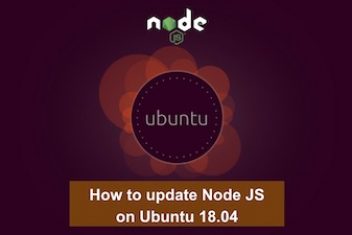Node.js is a server-side platform built on Google Chrome’s JavaScript V8 JavaScript engine. It is a popular choice for web application development due to its fast and efficient performance, scalability, and flexibility. In this article, we will be discussing the best Node.js frameworks for web apps in 2023 and exploring their key features in detail.
Key Features of Node.js:
- Scalability: Node.js is designed to be easily scalable, which makes it a great choice for web applications that are expected to handle a lot of traffic.
- Asynchronous Processing: Node.js uses an event-driven, non-blocking I/O model, which makes it well-suited for real-time, data-intensive applications. This means that the server can handle multiple requests simultaneously, without waiting for one request to complete before processing another.
- Performance: Node.js is built on Google’s V8 JavaScript engine, which is known for its fast performance. This makes it possible to build high-performance web applications that can handle a large number of requests.
- Rich Library Ecosystem: Node.js has a large, active community of developers who have created a wide variety of libraries and modules that can be used to extend the functionality of the platform. This makes it easier for developers to build complex applications without having to start from scratch.
Read: Why Choose Node.js for Real-Time Application Development
Express.js:
Express.js is a minimal and flexible framework that is often used as the starting point for web application development in Node.js. It provides a set of features and middleware that allow you to quickly build RESTful APIs and web applications. One of its main advantages is its lightweight design, which makes it easy to use and understand for developers of all levels of experience.
Key Features:
- Lightweight and flexible design
- Robust routing capabilities
- Built-in middleware for common web development tasks
- Robust community support and extensive documentation
Who should use it?
Express.js, which is one of the most used nodejs backend frameworks, is a great choice for developers who are looking for a flexible and minimal framework to build simple to complex web applications and RESTful APIs. It is also ideal for developers who prefer a hands-on approach to web development and want more control over the structure and functionality of their application.
Read: 8 Skills Needed To Become A Hirable NodeJs Developer In 2022
Sails.js:
Sails js is a Model-View-Controller (MVC) framework that is designed to make it easy to build scalable and fast web applications. It is built on top of Express.js and provides a high-level, easy-to-use interface for working with databases, authentication, and other common web development tasks.
Key Features:
- Built-in support for common web development tasks
- Real-time communication capabilities using WebSockets
- Flexible database integration
- Easy-to-use API and ORM
Who should use it?
Sails.js is a great choice for developers who are looking to build scalable, real-time web applications and are looking for a high-level, easy-to-use interface for working with databases and other common web development tasks.
Read: How to keep a nodejs server running permanently
Socket.io:
Socket IO js is a real-time communication library for Node.js that allows for seamless, bi-directional communication between web clients and servers. It is a popular choice for web app development as it provides a fast, efficient and reliable way to exchange data in real-time. With its ability to handle a high number of simultaneous connections and low latency, Socket.io has become a popular choice for building chat applications, multiplayer games and real-time dashboards.
Key Features:
- Real-time communication: Socket.io allows for real-time communication between the client and server. This means that data can be exchanged in real-time without the need for a page refresh.
- Scalable: Socket.io can handle a large number of simultaneous connections. This makes it a great choice for building scalable applications.
- Cross-platform compatibility: Socket.io can be used on a variety of platforms including web browsers, mobile devices, and servers.
- Easy to use API: Socket.io has a simple, easy to use API that allows developers to get up and running quickly.
- Built-in reconnection handling: In the event of a disconnection, Socket.io will automatically attempt to reconnect. This helps ensure that the connection is always available, even in the case of network interruptions.
Who should use it?
Socket.io is a great choice for web developers who want to build real-time applications such as chat applications, multiplayer games, and real-time dashboards. If you are building an application that requires fast, efficient and reliable real-time communication, then Socket.io is definitely worth considering. Additionally, if you are working on a project that requires scalability, cross-platform compatibility and a simple, easy to use API, then Socket.io is a great choice.
Koa:
Koa JS is a relatively new framework that is designed to provide a minimal and elegant foundation for building web applications. It provides a set of middleware and utilities that allow you to build web applications with a simple and expressive API.
Key Features:
- Minimal and elegant design
- Async functions-based middleware
- Error handling and debugging tools
- Robust community support
Who should use it?
Koa.js is a great choice for developers who are looking for a minimal and expressive framework for building web applications. It is ideal for developers who are looking for a hands-on approach to web development and want more control over the structure and functionality of their application.
Nest:
Nest is a framework for building scalable and efficient server-side applications in Node.js. It is built on top of Express.js and provides a high-level interface for working with databases, authentication, and other common web development tasks.
Key Features:
- Built-in support for common web development tasks
- Modular architecture
- Extensive documentation and community support
- Robust error handling and debugging tools
Who should use it?
Nest.js is a great choice for developers who are looking to build scalable and efficient server-side applications in Node.js. It is ideal for developers who want a high-level interface for working with databases, authentication, and other common web development tasks.
Read: Why Is Web Application Development Important for Businesses
Meteor:
Meteor JS is an open-source, full-stack JavaScript framework for building web applications. It’s a complete platform for building real-time web and mobile apps and is known for its simplicity, speed, and efficiency. Meteor is also a great choice for building complex and scalable applications, as it has an impressive set of features that make it easy to build and maintain.
One of the key features of Meteor.js is its real-time capabilities, which allow for instant updates to the user interface. This makes it ideal for building chat apps, live collaboration tools, and other real-time applications. Meteor also integrates with a number of popular front-end frameworks, including React, Angular, and Vue.js, making it easy to build custom user interfaces.
Meteor also offers a number of tools and services to help developers build and maintain their applications, including a package manager, an integrated development environment, and a cloud platform for deploying and scaling apps. Meteor also has a large and active community of developers, which makes it easy to find help and resources when needed.
In terms of performance, Meteor is known for its speed and efficiency. It uses Node.js for its server-side code and can be easily optimized for performance using tools such as Node.js profiling and debugging. Meteor also uses MongoDB for its database, which is known for its scalability and ease of use.
Who should use Meteor? Meteor is a great choice for developers who want to build real-time applications quickly and efficiently. It’s ideal for small to medium-sized projects, but can also be used for large and complex projects as well. Meteor is also a good choice for developers who want a complete platform for building web and mobile apps, as it offers a number of tools and services to help with development and deployment.
Conclusion
There are numerous Node.js frameworks available to choose from, each offering their own set of features and functionalities that cater to different needs. It’s important to keep in mind what your end goals are for your web app and pick the framework that best aligns with those goals. If you need a fast and lightweight framework, Express.js or Koa would be great choices. If you need a full-stack framework, Meteor or Sails.js would be the way to go. If you’re looking for a framework that prioritizes security and scalability, Nest.js could be the perfect fit. Ultimately, the best Node.js framework for your web app depends on your specific requirements, so take the time to consider your needs and do your research before making a decision.
If you like the content, we would appreciate your support by buying us a coffee. Thank you so much for your visit and support.


